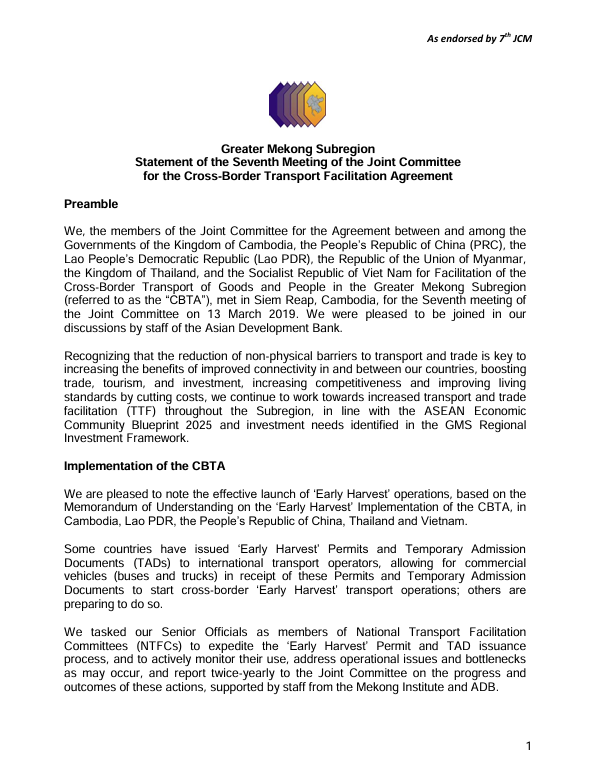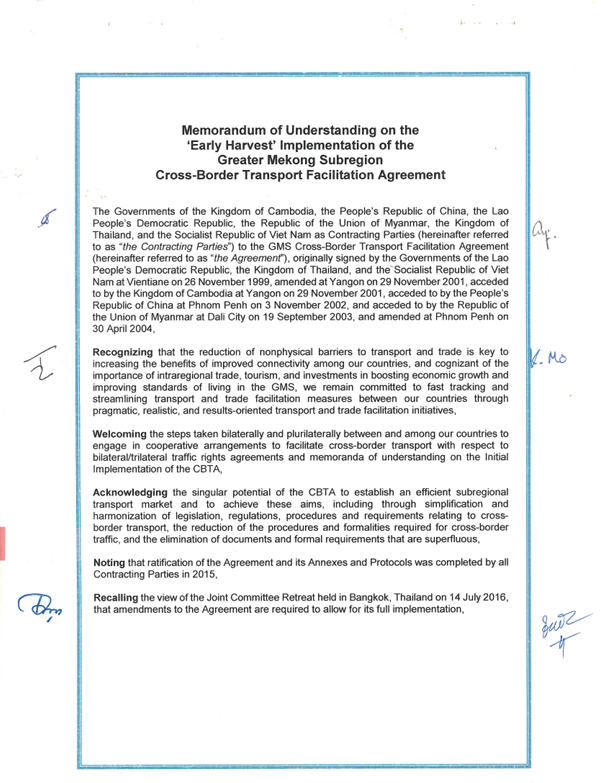Myanmar to Build Deepwater Port, SEZ in Yangon
Myanmar plans to develop a deep-sea port and special economic zone in Yangon, the country’s commercial capital.
Countries of the Greater Mekong Subregion are working to make the movement of goods and services across borders faster, easier, cheaper, more compliant, and more inclusive.
Over the past decade, the Greater Mekong Subregion’s (GMS) road network has expanded by almost 200,000 kilometers, and overland road freight has almost doubled. Yet despite these advances, remaining barriers to trade and transport continue to inhibit the subregion’s full economic potential and the cost of cross-border land transport remains high.
With much of the hard infrastructure in place, there has been a greater focus in recent years on the rules, regulations, agreements, and other “software” to make the movement of goods and services across borders in the GMS faster, easier, cheaper, more compliant, and more inclusive.
The GMS Economic Cooperation Program Strategic Framework 2030 (GMS-2030) focus on trade facilitation will modernize customs and establish sanitary and phytosanitary regulations. It will also strengthen links to the private sector. GMS-2030 will support the development of e-commerce platforms in the subregion. By facilitating investment, the strategy will ease or eliminate investment flow constraints and create an integrated investment market. GMS-2030 was endorsed and adopted at the 7th GMS Summit of Leaders in September 2021. It aims to provide a new setting for the development of this subregion for the next decade.
The GMS Transport and Trade Facilitation Action Program is working to overcome existing barriers in order to link the subregion to the ASEAN Economic Community’s single market and production base, as well as other regional cooperation initiatives.
The program is helping to expand transport and traffic rights along the GMS Cross Border Transport Facilitation Agreement (CBTA). route network; simplify and modernize customs procedures and border management; and strengthen the capacity of sanitary and phytosanitary agencies in the subregion.
To facilitate progressive implementation of the CBTA, the GMS Transport Ministers as members of the CBTA Joint Committee agreed to an “Early Harvest” memorandum of understanding to allow the issuance and mutual recognition of GMS Road Transport Permits along the CBTA Protocol 1 route network and the border crossing points along these routes starting August 2018. This initiative was suspended with the closure of international borders during the Covid-19 health pandemic, but reinstated by the Ministers for a further three-year period at the Eighth CBTA Joint Committee meeting in December 2023.
Related
• ‘Early Harvest’ Implementation of the Cross-Border Transport Facilitation Agreement
• Joint Committee for the CBTA
• Statement of the Seventh Meeting of the Joint Committee for the CBTA (13 March 2019)
Focal Persons at the Asian Development Bank
Asadullah Sumbal
Regional Cooperation and Integration Unit Southeast Asia Department
Dorothea Lazaro
Regional Cooperation and Integration Unit
Central and West Asia Department
Mohammad Nazrul Islam
Transport Sector Office
Sectors Group
Other Concerned Staff & Consultants
Antonio Ressano
Regional Cooperation and Integration Unit
Southeast Asia Department
Lucia Martin Casanueva
Regional Cooperation and Integration Unit
Southeast Asia Department/GMS Secretariat
Send inquiries to GMS Secretariat.
Myanmar plans to develop a deep-sea port and special economic zone in Yangon, the country’s commercial capital.
Thailand is embarking on several projects in its northeastern region to improve travel to the Lao People’s Democratic Republic (Lao PDR).
Thailand is spending 100 billion baht ($3 billion) in infrastructure to strengthen its position as a transport and trade hub along the economic corridors of the Greater Mekong Subregion.
The six countries of the Greater Mekong Subregion have agreed to extend the “early harvest” implementation of their Cross-Border Transport Facilitation Agreement (CBTA) for 2 years.
Cambodia and Thailand reconnected their railroad networks on Monday after 45 years to facilitate cross-border trade and transport.
The Singapore subsidiary of Kerry Logistics Network Limited will develop a dry port in the capital of the Lao People’s Democratic Republic with local company Sitthi Logistics.
A new bridge now links the border towns of Myawaddy in Myanmar and Mae Sot in Thailand.

This is the statement issued by the Joint Committee for the Cross-Border Transport Facilitation Agreement during its seventh meeting in Siem Reap, Cambodia on 13 March 2019.

The six countries of the Greater Mekong Subregion signed a Memorandum of Understanding (MOU) on the “Early Harvest” Implementation of the Cross-Border Transport Facilitation Agreement in 2017 and 2018.
Download the MOU, CBTA Early Harvest brochures, and related documents.
Japan and the five Southeast Asian countries of the Greater Mekong Subregion adopted the Tokyo Strategy 2018 at the 10th Mekong-Japan Summit Meeting in Tokyo on 9 October.